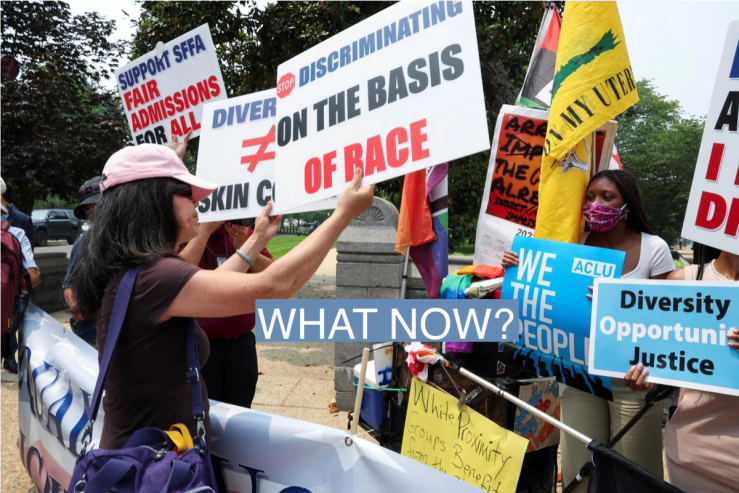The News
America is waking up on Friday to a post-affirmative action world after the Supreme Court’s 6-3 decision. Here’s how the major players in Washington and beyond are reacting to the news, and where they’re planning to take things from here in response.
The View From The White House
President Biden’s most significant comment: “This is not a normal court.”
With Dobbs already central to his re-election bid, the comment to a reporter on Thursday is the latest sign Biden is seeking an open confrontation with the conservative justices. The court’s popularity plummeted in polls after Dobbs, but FiveThirtyEight’s Cooper Burton notes some tentative signs it’s begun to recover.
But what you won’t hear the president do is call for an expansion of the court, as some progressives again demanded on Thursday. “I think if we start the process of trying to expand the court, we’re going to politicize it maybe forever in a way that is not healthy,” he said during a rare television interview on MSNBC yesterday afternoon.
The court fight could also elevate Vice President Kamala Harris, who has played a significant role responding to its abortion decision. Speaking at the Essence Festival on Thursday, she said the latest decision showed that “whatever gains we make, they will not be permanent” and must be constantly defended.
The View From The Obamas
The first Black president condemned Thursday’s decision, which was authored by three justices appointed by another president who once offered $50 million for his college records while baselessly suggesting that he was a token admission to Columbia University and Harvard Law School who possibly listed his birthplace as Kenya in the application.
The pain of those kinds of race-baiting taunts came across in Michelle Obama’s statement, which recalled her insecurities about being dismissed as an “affirmative action” student in college. While the admissions program was not “perfect,” she wrote, she strongly supported it: “So often, we just accept that money, power, and privilege are perfectly justifiable forms of affirmative action, while kids growing up like I did are expected to compete when the ground is anything but level.” Barack Obama said the program “allowed generations of students like Michelle and me to prove we belonged.”
The View From 2024 Republicans
Donald Trump celebrated the decision as “the ruling everyone was waiting and hoping for,” along with the rest of the field. Senator Tim Scott, the most prominent Black candidate in the race, said on Fox that schools should “make sure that all admissions are based on academic scores” and end legacy preferences as well.
Ron DeSantis’ campaign used the occasion to throw a punch, sharing a video of Trump saying he was “fine with affirmative action” in a 2015 Meet The Press appearance. It’s the latest example of DeSantis — who also recently criticized Trump’s Supreme Court picks from the right — attacking Trump as a fairweather conservative.
The View From Harvard
The higher education world is already seizing on a major caveat in Roberts’ decision that some think may leave a path open to continue factoring race into admissions in some form. “Nothing in this opinion should be construed as prohibiting universities from considering an applicant’s discussion of how race affected his or her life, be it through discrimination, inspiration, or otherwise,” the chief justice wrote.
In other words, students can still get a boost if they write a moving essay about their experience with racism. Harvard University called attention to the line in its statement after the decision came down, while President Biden noted it as he called for colleges to adopt a new standard that gave applicants points for overcoming adversity.
Some higher education administrators are predicting a further shift away from quantifiable metrics like standardized tests, which many schools have already made optional, towards more subjective personal evaluations as schools try to maintain diversity in their classes. “Will it become more opaque? Yes, it will have to,” Danielle Ren Holley, the soon-to-be president of Mount Holyoke College, told the New York Times. “It’s a complex process, and this opinion will make it even more complex.”
The View From Civil Rights Activists
NAACP CEO and President Derrick Johnson said activists would continue to “hold leaders and institutions accountable for their role in embracing diversity no matter what” and “not allow hate-inspired people in power to turn back the clock and undermine our hard-won victories.” The decision comes as civil rights leaders are also confronting a backlash on the right against “diversity equity and inclusion” initiatives in government, corporations, and education.
The View From The Boardroom
Though today’s decision only focused on academia, it’s already raising questions about the future of corporate diversity efforts. It comes at a moment that anti-affirmative action groups are already mounting legal challenges to rules requiring diversity on company boards. Will Hild, executive director of the conservative advocacy group Consumers’ Research, told the Washington Post the decision would “put the wind in the sails of groups like ours, who want to get the woke, racially based hiring and promotion schemes out of corporate America.”
America First Legal, the organization founded by former Trump adviser Stephen Miller, has filed a number of complaints with the Equal Employment Opportunities Commission accusing large companies of hiring based on race and sex, setting up potential litigation.
The View From The Military
No changes there. The decision exempted military academies from bans on race-based admission, with Roberts noting they have “potentially distinct interests” in maintaining diversity to foster cohesion between officers and the soldiers under their command.
National security writer Spencer Ackerman argues this undercuts the decision’s logic: “If affirmative action benefits national security, which is the core of the military’s position, then it makes no sense to consider affirmative action harmful or discriminatory in the less-life-or-death circumstances of civilian college admissions.”



